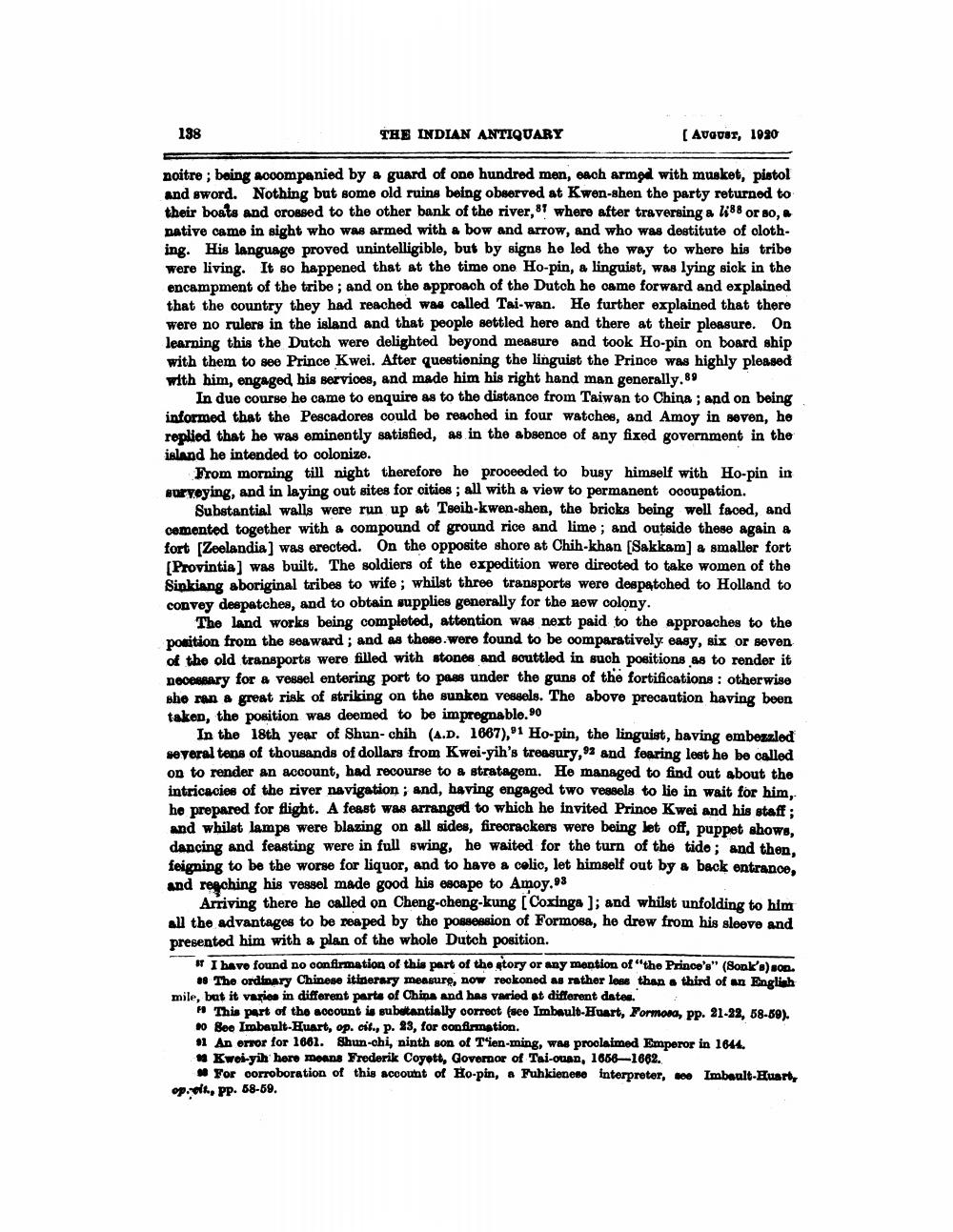________________
138
THE INDIAN ANTIQUARY
[AUGUST, 1920
noitre; being accompanied by a guard of one hundred men, each armed with musket, pistol and sword. Nothing but some old ruins being observed at Kwen-shen the party returned to their boats and crossed to the other bank of the river," where after traversing a li88 or so, a native came in sight who was armed with a bow and arrow, and who was destitute of clothing. His language proved unintelligible, but by signs he led the way to where his tribe were living. It so happened that at the time one Ho-pin, a linguist, was lying sick in the encampment of the tribe; and on the approach of the Dutch he came forward and explained that the country they had reached was called Tai-wan. He further explained that there were no rulers in the island and that people settled here and there at their pleasure. On learning this the Dutch were delighted beyond measure and took Ho-pin on board ship with them to see Prince Kwei. After questioning the linguist the Prince was highly pleased with him, engaged his services, and made him his right hand man generally, 89
In due course he came to enquire as to the distance from Taiwan to China; and on being informed that the Pescadores could be reached in four watches, and Amoy in seven, he replied that he was eminently satisfied, as in the absence of any fixed government in the island he intended to colonize.
From morning till night therefore he proceeded to busy himself with Ho-pin in surveying, and in laying out sites for cities; all with a view to permanent occupation.
Substantial walls were run up at Tseih-kwen-shen, the bricks being well faced, and cemented together with a compound of ground rice and lime; and outside these again a fort [Zeelandia] was erected. On the opposite shore at Chih-khan [Sakkam] a smaller fort [Provintia] was built. The soldiers of the expedition were directed to take women of the Sinkiang aboriginal tribes to wife; whilst three transports were despatched to Holland to convey despatches, and to obtain supplies generally for the new colony.
The land works being completed, attention was next paid to the approaches to the position from the seaward; and as these were found to be comparatively easy, six or seven of the old transports were filled with stones and scuttled in such positions as to render it necessary for a vessel entering port to pass under the guns of the fortifications: otherwise she ran a great risk of striking on the sunken vessels. The above precaution having been taken, the position was deemed to be impregnable.90
In the 18th year of Shun- chih (A.D. 1667),1 Ho-pin, the linguist, having embezzled several tens of thousands of dollars from Kwei-yih's treasury, 92 and fearing lest he be called on to render an account, had recourse to a stratagem. He managed to find out about the intricacies of the river navigation; and, having engaged two vessels to lie in wait for him, he prepared for flight. A feast was arranged to which he invited Prince Kwei and his staff; and whilst lamps were blazing on all sides, firecrackers were being let off, puppet shows, dancing and feasting were in full swing, he waited for the turn of the tide; and then, feigning to be the worse for liquor, and to have a celic, let himself out by a back entrance, and reaching his vessel made good his escape to Amoy.93
Arriving there he called on Cheng-cheng-kung [Coxinga ]; and whilst unfolding to him all the advantages to be reaped by the possession of Formosa, he drew from his sleeve and presented him with a plan of the whole Dutch position.
I have found no confirmation of this part of the story or any mention of "the Prince's" (Sonk's) son. ss The ordinary Chinese itinerary measure, now reckoned as rather less than a third of an English mile, but it varies in different parts of China and has varied at different dates.
This part of the account is substantially correct (see Imbault-Huart, Formosa, pp. 21-22, 58-59). 20 See Imbault-Huart, op. cit., p. 23, for confirmation.
91 An error for 1661. Shun-chi, ninth son of Tien-ming, was proclaimed Emperor in 1644.
14 Kwei-yih here means Frederik Coyett, Governor of Tai-ouan, 1656-1662.
8 For corroboration of this account of Ho-pin, a Fuhkienese interpreter, see Imbault-Huart, op. cit., pp. 58-59.




